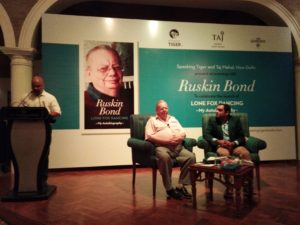Ravi Singh’s speech introducing Ruskin Bond, 20 June 2017
On 20 June 2017 Ruskin Bond’s autobiography Lone Fox Dancing was released at Taj Man Singh Hotel, New Delhi. He was in conversation with noted journalist Nalin Mehta. To introduce Ruskin Bond his long time editor and co-founder Speaking Tiger, Ravi Singh, read out a beautiful speech remembering their decades of association. With Ravi Singh permission the speech is published below. I am also including a short clip I made at the launch of Ruskin Bond talking about the noted Hindi writer Rakesh Mohan being his teacher at Bishop Cotton School, Simla and later Bond’s poor attempt at translating Tennyson’s poem “Charge of the Light Brigade” into Hindi.
I remember my first meeting with Mr Bond. It was in 1995, shortly after I’d entered publishing, and I was both excited and nervous. I’d read his stories in school—‘The Kite Maker’, ‘A Face in the Dark’, ‘The Room of Many Colours’, ‘The Tiger in the Tunnel’—and I’d gone back to them many times: there was wonder and magic, of course, but they were also about unusual things—about losing and dying; children finding fellowship with elderly strangers; mutual, unspoken respect between people and animals; and some very subtle and scary ghosts. He was to me the equal of Chekhov, Tagore, Premchand or Dickens—like a benevolent but unreachable legend. By the time I met him, I had read many of his other works, including the intensely moving classic The Room on the Roof—and the memorable long stories A Flight of Pigeons, Time Stops at Shamli and Delhi Is Not Far.
So I wasn’t at all prepared for the understated, warm, witty and utterly approachable person who treated me as an equal and made me a friend. This happened so effortlessly, that it was only much later that I was surprised and grateful. It seemed entirely natural to have such an engaging and generous companion. And that is exactly whatRuskin Bond’s stories have done to millions over 60 years—to readers of all ages, and in big cities, small towns and little hamlets. Only the greatest writers can do that.
Lone Fox Dancing is the story of the making of this extraordinary storyteller and human being, who has never been afraid to be simple and entirely himself. The autobiography begins in Mussoorie in the 1930s, moves to Jamnagar, Dehradun, New Delhi, Jersey, London, and returns to Mussoorie. There’s mischief and adventure in it; there’s also loneliness, resilience, eccentricity, conviction, compassion—and above all, there’s friendship—with people, with birds and animals, with great trees and with little flowers growing out of broken concrete.
Read this book to see what’s been gained and lost in India since the 1930s and 40s—not in the halls of power but in the streets and mohallas, bazaars and cinema halls, jungles and railway stations. Read it to know how writers are made, beyond noise and glamour. Read it for the art of carrying on when you lose a beloved parent, when your work is rejected or under-appreciated, when someone you love doesn’t love you back, when people fail you or you fail them, when your earnings are paltry though your responsibilities are growing, or when winters get cold and miserable.Ruskin Bond has found there’s always reward if you persevere; there’s spring and birdsong after harsh winters, there’s beauty and there are friends in unexpected places, and a sense of humour—a good joke—and plain old optimism will sustain you through hard times and keep you grounded in good times.
Mr Bond’s long-awaited autobiography has everything we’ve cherished in his enduring stories and essays.
I really shouldn’t stand any longer between you and one of our finest, most entertaining and best-loved writers—except to say how delighted and privileged we are to have published his autobiography…
26 June 2017



